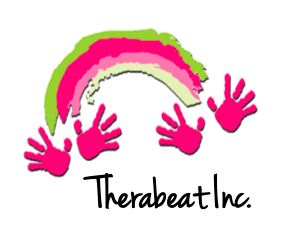Two years ago when I started doing a literature review, on the effect music therapy had on Angelman Syndrome, there was no research that combined music therapy and Angelman Syndrome. At my clinical site I saw music therapy’s effect first hand with a child who has Angelman Syndrome. I began a research plan and started collecting data. First I needed to know what Angelman Syndrome was and the different characteristics that accompany this diagnosis. It is a neurogenetic disorder that is caused by a defect in chromosome 15; this affects 1 in 15,000 live births. Some common characteristics are: developmental delay, speech impairment, movement or balance disorder, appears typically happy, seizures, and aggressive behaviors. My client was a ten year old caucasian female who was nonverbal and had a tip toe gait. She had a developmental delay, appeared typically happy, and showed aggressive behavior.
When I started music therapy sessions in this classroom my client would not sit still unless she was asleep. She would typically express erratic and aggressive behavior. I started doing individual sessions with her that lasted about ten minutes because that was all the attention she was able to give. She became attached to the ocean drum; she would hit the drum and hold it against her face. Her goal for the Fall Semester was to increase participation as operationally defined as playing an instrument and staying in seat. She Improved in her seat timeand instrument play from 5 minutes and 10 times to 8 minutes and 20 times. Music was a calming and interactive reinforcement that worked to improve seat time. Her goal for the Spring Semester was to increase independence as operationally defined by sitting on the toilet without interventions from the therapist or teacher. She increased her independence from 62 seconds with 4 interventions to 30 seconds and only 2 interventions. Music was used as a positive reinforcement; I sang hello then brought her to the bathroom using a bathroom song. Once she was finished I took her to play some of her favorite instruments.
Overall I saw great progress toward these goals. She became less aggressive toward other students in the class. I would recommend music therapy as an important therapy for children with Angelman Syndrome. Many of the techniques I used I feel I can incorporate into my sessions with clients at Therabeat even if they do not have Angelman Syndrome. Techniques such as: listening to the clients improvisation and understanding how they are feeling if they cannot speak for themselves, how to ease into having a client hold and play an instrument if they like to throw things, and how to redirect aggressive behaviors through the use of music. I would like to continue to research music therapy’s effects on children with Angelman Syndrome through the pursuit of my masters and doctorate.
-Dana LaValley, Music Therapy Intern
Resources: The Facts about Angelman Syndrome [Brochure]. (n.d.) Aurora, IL: Angelman Syndrome Foundation.





